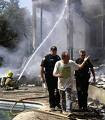
Install
“duo” smoke alarms.
You may not have a pet parrot to save you. So, for each floor in your home - and near all bedrooms - get a dual sensor smoke alarm that combine ionization and photoelectric into one unit. Here’s why. Ionization alarms sound more quickly when a flaming, fast moving fire occurs. Photoelectric alarms are quicker at sensing smoldering, smoky fires.
Since you can’t predict what kind of fire might happen, be as protected as you can with the duo, recommends the The U.S. Fire Administration.
Get standard type battery powered smoke alarms, Batteries need to be replaced at least once per year and the whole unit should be replaced every 8-10 years.
Your alternatives are:
a. smoke alarms powered by long-lasting batteries, but you must replace the whole alarm when you need new batteries, or
b. smoke alarms with hard-wired, battery back up. The batteries need to be checked monthly, and replaced at least once per year. The entire unit should be replaced every 8-10 years.
Be sure to look for the UL mark before you buy your alarm.
• The U.S. Fire Administration makes these further suggestions to stay safe at home:
* Plan and practice escape plans several times a year.
* Make sure your whole family knows when and how to call emergency telephone numbers.
* Obtain and learn how to use a fire extinguisher.
* Install carbon monoxide detectors.
* Consider installing residential fire sprinklers in your home.
Contact your local fire department - on a non-emergency phone number - if you need help or have questions about fire safety in your home.



